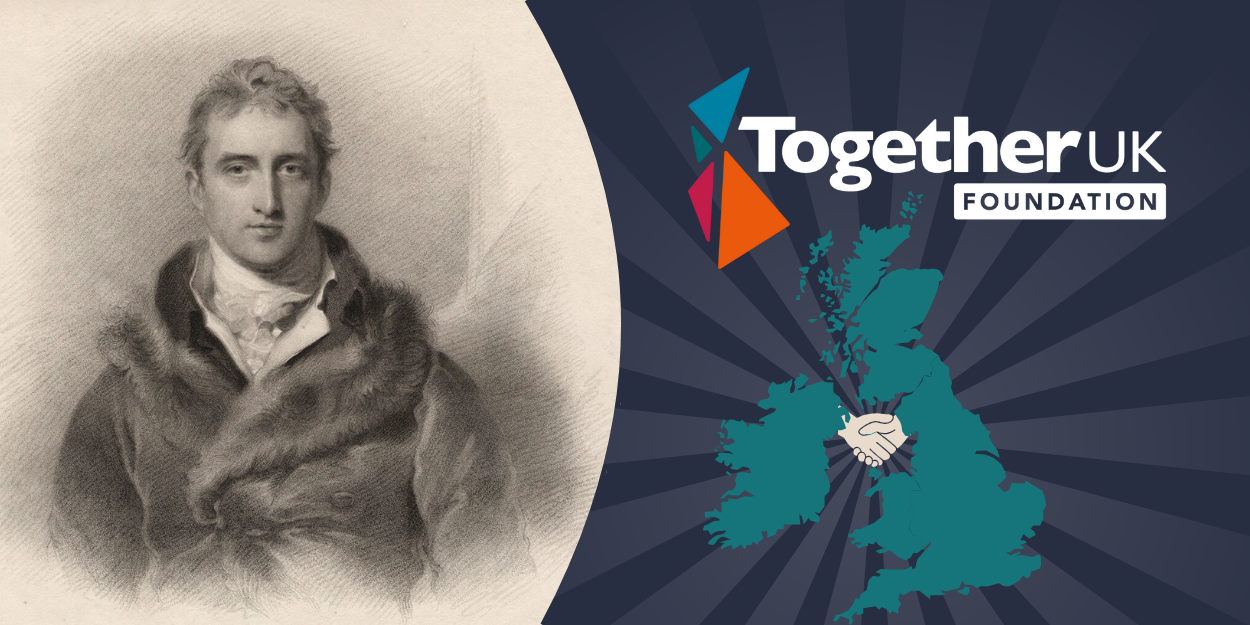
Together UK and Castlereagh
Together is a keyword in Plato’s Republic. The Ancient Greek philosopher pointed out that each one of us is not self-sufficient but needs the help and contribution of others. This is the basis for society. Each nation of the United Kingdom benefits from being together.
Lord Castlereagh (1769-1822) spoke in favour of the United Kingdom in a speech before the Irish House of Commons of February 1800. If Ireland were not together with the United Kingdom, it would mean that those who lived in Ireland would be treated as second class citizens. They would be a colony. For him, the Act of Union (1800) provided equal treatment for all subjects within the Union. Those outside the UK would be subject to laws which they could not discuss or deliberate. They would not be able to change the rules which defined their lives and commerce. He was thinking of the American revolutionary slogan ‘taxation without representation’: duties without benefits.
He believed in equal rights and duties between English, Welsh, Scots and Irish. Together they would have a stronger defence and foreign policy. Free trade within the British Isles would increase prosperity. The markets accessible to England would also be available to Ireland without tariffs or duties. In Castlereagh’s words:
“if I were to describe a colony, I would picture a country in a situation somewhat similar to that of Ireland at present. I would describe a country, whose Crown was dependent on that of another country, enjoying a local Legislature, but without any power entrusted to that Legislature.”
He added that such a situation would create international isolation:
“I would describe it as a country unknown to foreign nations, in the quality of an independent state, and as subject to another power with regard to all the questions which concern alliances, the declaration and conduct of war, or the negotiations for peace.”
He also argued for the importance of no duties between the nations of the United Kingdom:
“By the second Section, all prohibitions on the export of the produce of either country to the other are to cease, and all articles are to be exported duty free. […] The system of Union puts an end at once to all jealousy between the nations and gives to each the full and free participation of their respective advantages.”
Castlereagh also pointed out that Great Britain and Ireland would form a great force in the face of difficulties on the continent of Europe:
“If this great work shall be effected, and if at any future day the enemies of Great Britain and mankind shall again be let loose upon the social world, I doubt not that Ireland will be in such a situation of unanimity and power as to bear a conspicuous part with Great Britain in the glorious task of again delivering and restoring the liberties of Europe.”
The Act of Union of 1800 passed, became law, and defines the constitutional structure of the United Kingdom today. It is controversial. Nevertheless, the guiding principle was that together is better than isolated.
Castlereagh had argued the same points in 1792, long before the controversy surrounding the Act of Union. He had feared that an independent Ireland would have no diplomatic weight:
“I am afraid that the Powers of Europe might possibly receive an Irish ambassador charged with negotiation of this nature with less respect than our friends experienced when they bore the crown of Regency of the Prince of Wales.” He continues “I am afraid we should cut a sorry figure and exhibit an appearance not very imposing were we to appear before them simply clad in the garb of our insular dignity and abstracted freedom.”
Castlereagh pointed out that Ireland had no fleet and would have to rely on a foreign navy to protect its commercial routes:
“The fleet of England is in my opinion the charter by which we hold that commerce. Were its protection withdrawn we must either throw ourselves at the feet of some other maritime power or remain exposed to the insults and robberies of every insignificant armed ship that sails the sea. It is physically impossible that we should ever have a fleet or our own; and it is absurd and romantic to imagine that we can ever exist for any length of time as a separate and independent state.”
Together was the keyword for Castlereagh. The collaboration between the British Isles was inevitable because they are geographically close. For him, it was not inevitable, but desirable, if they lived together with the same rights under the same legal system. That would allow for an equal partnership.
Castlereagh pointed out that free trade, equality before the law, and a common defence system were the aims of the Act of Union. His points are still relevant today, even if in different circumstances. His considerations stem from Plato’s point that individuals are not self-sufficient and need society to prosper:
Γίγνεται τοίνυν, ἦν δ’ ἐγώ, πόλις, ὡς ἐγᾦμαι, ἐπειδὴ τυγχάνει ἡμῶν ἕκαστος οὐκ αὐτάρκης, ἀλλὰ πολλῶν ἐνδεής· ἢ τίν’ οἴει ἀρχὴν ἄλλην πόλιν οἰκίζειν;
“So, a city will occur, I think, because none of us is self-sufficient, but needs many things, or do you think a city is established for another reason?” (Plato Republic 3.369b7-9).
For Plato and Castlereagh, society is based on living and working together.
Dr Frederick Lauritzen

